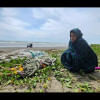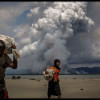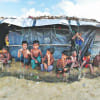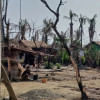Dhaka can pursue ICC options

Bangladesh need not suffer from indecision as to whether it would be better for it to opt for politically or diplomatically negotiated settlement, instead of participating in the ICC process by submitting the opinion on investigating the possible atrocity crimes against the Rohingya, said Prof Rafiqul Islam.
“There is no legal bar for Bangladesh to explore both options together and there are ample precedents of such initiative in international relations. The nature of political or diplomatic and ICC settlement are totally different and independent of each other,” said the professor of international law.
His suggestions are significant as Bangladesh still remains undecided whether it will respond to the May 7 ICC letter, seeking Bangladesh's written observations by June 11 on the Hague-based court's jurisdiction to investigate forced deportation of over 700,000 Rohingya from Myanmar to Bangladesh since August last year.
Earlier on April 9, the ICC Prosecution wrote to the Court requesting a ruling on the matter. The filing argued though the crime was committed in Myanmar, which is not a party to the Rome Statute, the Rohingya fled to Bangladesh, a party to the statute.
Rafiqul, a Bangladeshi, is an active legal academic and researcher and has published extensively, mostly on international law. He has spoken comprehensively with The Daily Star on the ICC's move.
Below is the full interview.
DS: What is your opinion about the ICC's letter to Bangladesh? Is there any precedence of such investigation as sought by the ICC on the deportation of Rohingya?
Rafiqul: The ICC appears to lack jurisdiction over the displaced Rohingya in Bangladesh if one goes by the jurisdictional provision of the ICC Statute, which requires a territorial link with the crime and its perpetrator. The ICC crimes need to be committed in the territory of a member state of the ICC or the individual perpetrator is a national of a member state of the ICC. Since Myanmar is not a member of the ICC, generally the ICC jurisdiction is inoperative over Myanmar. However, the forcible deportation of Rohingya to across an international border into Bangladesh, a member of the ICC, can create a special case for the operation of the ICC jurisdiction.
DS: If there is no such precedent, how can the ICC go ahead?
Rafiqul: There is no precedent yet where the ICC has asserted its jurisdiction over such a situation. However, unprecedented does not necessarily mean no new precedent, where appropriate, can be created through the progressive extrapolation and interpretation of the ICC jurisdictional provision. The ICC Prosecution and Pre-trial Chamber can go beyond a mechanical interpretation to embrace an “intent” based interpretation. The very preambular intent of the ICC Statute imposing “the duty of every State [not only the ICC states] to exercise its criminal jurisdiction over those responsible for international crimes”. Forcible deportation constitutes a crime against humanity under article 7 of the ICC Statute. True, the army-operated atrocity crimes have been committed within the territory of Myanmar but these operations inculcated an insecurity and fear among Rohingya who fled to neighbouring Bangladesh for security.
There is an inseparable causal link between the atrocity crimes in Myanmar and the deported Rohingya in Bangladesh. It is this extraterritorial effect of the territorial acts of Myanmar army and nationals that should lead the ICC to extend its jurisdiction to afford justice to the Rohingya victims of the ICC crimes now sheltering in Bangladesh, a member state of the ICC. A rejection of jurisdiction on the technical pretext that the crimes have been committed in the territory of a non-party state (Myanmar) would essentially mean that the right to justice belongs to the territory not to the individual victims. This would frustrate the very purpose for which the ICC has been established: that the most serious crimes of concern to the international community as a whole must not go unpunished … [and] determined to put an end to impunity for the perpetrators of these crimes and thus to contribute to the prevention of such crimes.
Adopting an extended jurisdictional approach would require judicial activism on the part of the ICC Pre-trial Chamber. Its failure to respond to the heinous crimes committed against Rohingya in Myanmar would further exacerbate the ICC's ongoing public confidence crisis.
DS: How should Bangladesh respond to this letter from the ICC?
Rafiqul: Bangladesh must take this opportunity and submit a response. It should first rely on two well established principles of international law. First, no state or its components, entities, or nationals can lawfully carry out any activities within its territory that causes extraterritorial effect, which is injurious to another state. The atrocity crimes committed against Rohingya in Myanmar has been inflicting huge economic, social, and law and order problem for Bangladesh. And Bangladesh is not under any legal duty to tolerate or accept such interference of Myanmar' army men and other perpetrator groups. Bangladesh must present in its written submission the sufferings and material injuries it has been enduring which are solely attributable to the coercive cross-border deportation of Rohingya. It is this cross-border element of the crime of deportation that has been highlighted in the ICC prosecutorial submission to trigger the ICC jurisdiction over the Rohingya victims. Bangladesh must substantiate with tangible and corroborative evidence that it has become a victim of the crime of forcible deportation of Rohingya from Myanmar.
Secondly, Bangladesh need not suffer from indecision as to whether it would be better for it to opt for politically/diplomatically negotiated settlement instead of participating in the ICC process. There is no legal bar for Bangladesh to explore both options together and there are ample precedents of such initiative in international relations. The nature of political/diplomatic and ICC settlement are totally different and independent of each other. The former involves political and diplomatic manoeuvring, while the ICC will decide legally through the application of international criminal law and its Statute. As such, there would be no overlapping of jurisdiction. Following the Tehran hostage crisis in 1979, the US simultaneously launched both political/diplomatic and judicial initiatives in the Security Council and the ICJ respectively and secured favourable decisions from both fronts that put enormous pressure on Iran to release the hostages. Bangladesh would be better off by adopting both options as a strategy to generate enough international pressure on Myanmar to accept the repatriation and resettlement of Rohingya from Bangladesh. Relying on the political/diplomatic route alone in this era of cut-throat diplomacy devoid of any moral and reasoned approach is likely to fraught with a potential risk of undue procrastination of negotiations. Myanmar and its allies may go through the motion of negotiating without making any sincere and constructive initiatives to end the sufferings of Bangladesh. Opting for both options simultaneously can bring considerable political/diplomatic and legal pressures on Myanmar to bear.
DS: UN Security Council has so far not referred Myanmar's situation to the ICC because of oppositions from veto powers China and Russia. Therefore, trial of the alleged atrocity crimes mostly depends on the ICC. What is your opinion?
Rafiqul: The Security Council is notoriously known for its sectarian approach that always serves the geopolitical and geo-economic interests of its five permanent members and their allies. On the face of the Chinese and Russian interest involved in the Rohingya crisis, the chance of a referral to the ICC is seemingly bleak. Therefore, supporting the ICC jurisdiction over the Rohingya situation remains a viable option for Bangladesh. Bangladesh should fully cooperate with the ICC initiative by submitting a well-thought-out response to the ICC. If Bangladesh requires more time for the preparation of this response, the possibility of a time-prayer seeking additional time may be considered and pursued.
DS: Evidence collection of the crimes is an important factor. What is the imperative now?
Rafiqul: There is ample evidence of atrocities committed by Myanmar army men and vested interest groups effecting ethnic cleansing through coercive deportation. Both Bangladesh and interested human rights NGOs and aid groups can launch a joint venture to collect all evidence scattered all around. In addition to the evidence of widespread killing, rapes, and destruction of properties within Myanmar, there are too many live eyewitnesses and victims in the Rohingya camps in Bangladesh. The compilation of their testimonies may be a fertile source of evidence. It may not be necessary for Bangladesh to make a case for the commission of the ICC crimes in Myanmar, such as internal genocide and ethnic cleansing leading to deportation as crimes against humanity. The case has already convincingly been made in Prosecution of the Rohingya Muslims: Is Genocide Occurring in Myanmar's Rakhine State? A Legal Analysis (Allard K Lowerstein, International Human Rights Clinic, Yale Law School, October 2015).
Providing reliable and admissible evidence of atrocities and their injurious impacts on Bangladesh would be enough for the ICC Prosecution and Pre-trial Chamber to establish the essential linkage between the atrocity and its consequential involuntary crossing of international border as the legal element of the crime of deportation as enshrined in article 7 of the ICC Statute.

 For all latest news, follow The Daily Star's Google News channel.
For all latest news, follow The Daily Star's Google News channel. 








Comments